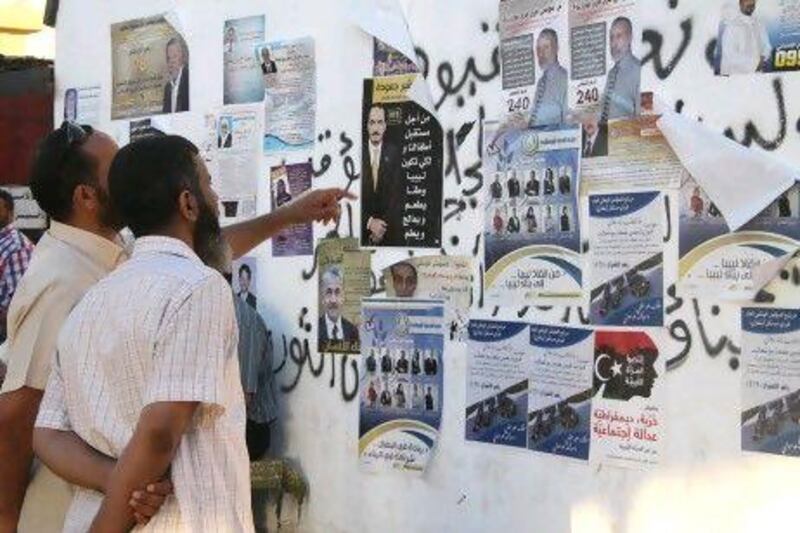BENGHAZI // The sun is setting on the scruffy seafront of Benghazi, casting copper light over hundreds of overlapping posters of electoral candidates, who gaze down on the strolling families below.
Libya's first elections since the fall of Muammar Qaddafi's regime are set for tomorrow, and many say they are excited to vote, discussing their choices at length.
Most also grumble about perceived discrimination against their city, a widely felt grudge that is fuelling a violent movement calling for autonomy for eastern Libya and a wholesale boycott of the election.
"People want decentralisation," said Abdulaziz Shelmani, an engineer sitting on the sea wall with his family, who is discontented with the disproportionate number of businesses and government projects in the capital more than 600 kilometres away.
Others in the city mention the allocation of seats in the assembly for which they will vote. About half the 200 seats are allocated to the more populous west of the country, which includes Tripoli, about 60 to the east, including Benghazi, and about 40 to the sparsely inhabited south.
The discontent has led to violence. The vital coastal road has been closed by armed groups calling for autonomous, federal status for the east of the country intermittently for weeks, according to local media. On July 1, hundreds of men burst past guards at the election authority's office outside Benghazi and began smashing computers and windows, burning papers and spraying pro-federalist graffiti on the walls. A fire at the storage centre for electoral materials in the eastern city of Ajdabia yesterday may have been started deliberately, a security source told Reuters.
There are those who support such moves, and are preparing for a federal state, with control over revenue from the region's hefty oil resources and its own security forces.
"Welcome to Benghazi, capital of Cyrenaica!" cries Ahmed Al Senussi using the historical name of Libya's eastern region, as visitors enter his office in the city centre. By his desk is the black flag with a white crescent that flew when Libya's east briefly declared itself an emirate in 1949, under the rule of Mr Al Senussi's great uncle, King Idriss.
Although he denies giving direct orders to the young men in mismatched uniforms hanging around his office to close roads or burn ballots, Mr Al Senussi said that it was natural for people to express their frustration at unfair treatment.
He said he has recruited to his cause dozens of tribal sheikhs and urban professionals as well as some brigades of fighters who fought in the city as part of last year's revolution that engulfed the country. These backers, he said, support his claim to be governor of Cyrenaica and his call for people to boycott elections.
"We want federalism," he said, "to unite Libya on a strong basis." He wants the oil-rich east to have control over its revenues.
Some hope Mr Al Senussi, who spent 31 years in jail under Qaddafi and was widely respected when the revolution began last year, will have little impact.
"The federalists are outlaws and do not represent Benghazi," said Mohammed Muna, a 42-year-old archaeologist. He said that he respected
Mr Al Senussi, who spent nine of the years in prison in solitary confinement. "But now he is moving for federalism, imposing it on people and I don't like him."
At the electoral office the day after the attack, security had been bolstered and a cleaning operation was under way. Employees of the High National Election Commission had arrived for work determined, they said, to make sure that the poll would go ahead.
Unfurling maps with complicated diagrams of seat allocation, a one-time schoolteacher who gave just his first name - Abdelaziz - insisted that the gunmen were not representative of the people of Benghazi.
"Most people are looking forward to voting day," he said. "They talk about the candidates, which one is well-educated, which one is religious." Most people eligible to vote have registered, he added.
Omar Wuhayshi, a local candidate with the Justice and Development Party, a Muslim Brotherhood-linked outfit, steered a tactful middle path on pre-election violence in Benghazi.
"We think that the problem is that people don't understand how the seats are allocated," he said from campaign headquarters. "The interim government did not raise awareness of what's going on and this is a natural outcome."
His party, he said, consulting a manifesto, wants to seek guarantees of decentralisation once the new national assembly begins its one official task of appointing a body to write constitution.
Federalism would not work in Libya, he said, in part because of the huge area over which its sparse population is spread. "So what we are aiming for is real representation," he said, citing the possible relocation of aviation companies as an example.
On July 2, thousands of people rallied in Benghazi to condemn federalism and call for the vote to go ahead smoothly. "The Arab world is already divided enough," said Noura Buzgeia, 16, as cheers and chants echoed in the background. The armed federalists, she said vehemently, acted alone.
"They didn't ask the people what they wanted. They just declared this army of Barqa," she said, referring to the Arabic name used for the east of Libya.
Amina Magherbi, an academic standing as an independent candidate in tomorrow's poll, acknowledged that electoral problems had arisen because of the use of different systems in various parts of the country.
"But the process of democracy has to go on," she said. "The election has so many flaws but if we stop, it is worse than if we carry on."
foreign.desk@thenational.ae





